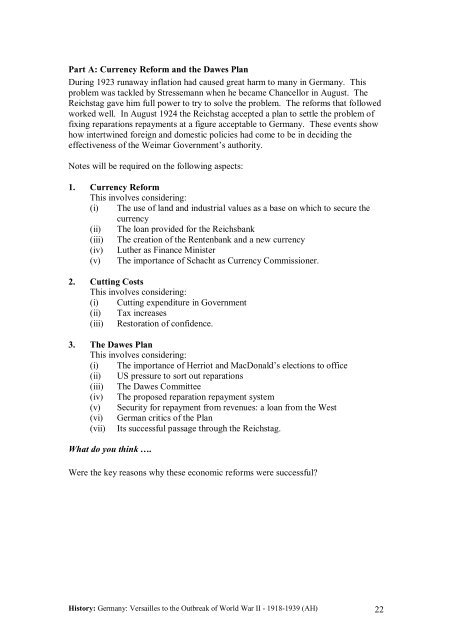PDF file: History - Advanced Higher - Germany - Education Scotland
PDF file: History - Advanced Higher - Germany - Education Scotland
PDF file: History - Advanced Higher - Germany - Education Scotland
You also want an ePaper? Increase the reach of your titles
YUMPU automatically turns print PDFs into web optimized ePapers that Google loves.
Part A: Currency Reform and the Dawes Plan<br />
During 1923 runaway inflation had caused great harm to many in <strong>Germany</strong>. This<br />
problem was tackled by Stressemann when he became Chancellor in August. The<br />
Reichstag gave him full power to try to solve the problem. The reforms that followed<br />
worked well. In August 1924 the Reichstag accepted a plan to settle the problem of<br />
fixing reparations repayments at a figure acceptable to <strong>Germany</strong>. These events show<br />
how intertwined foreign and domestic policies had come to be in deciding the<br />
effectiveness of the Weimar Government’s authority.<br />
Notes will be required on the following aspects:<br />
1. Currency Reform<br />
This involves considering:<br />
(i) The use of land and industrial values as a base on which to secure the<br />
currency<br />
(ii) The loan provided for the Reichsbank<br />
(iii) The creation of the Rentenbank and a new currency<br />
(iv) Luther as Finance Minister<br />
(v) The importance of Schacht as Currency Commissioner.<br />
2. Cutting Costs<br />
This involves considering:<br />
(i) Cutting expenditure in Government<br />
(ii) Tax increases<br />
(iii) Restoration of confidence.<br />
3. The Dawes Plan<br />
This involves considering:<br />
(i) The importance of Herriot and MacDonald’s elections to office<br />
(ii) US pressure to sort out reparations<br />
(iii) The Dawes Committee<br />
(iv) The proposed reparation repayment system<br />
(v) Security for repayment from revenues: a loan from the West<br />
(vi) German critics of the Plan<br />
(vii) Its successful passage through the Reichstag.<br />
What do you think ….<br />
Were the key reasons why these economic reforms were successful?<br />
<strong>History</strong>: <strong>Germany</strong>: Versailles to the Outbreak of World War II - 1918-1939 (AH) 22
















